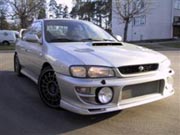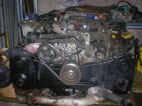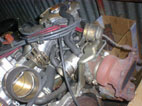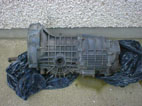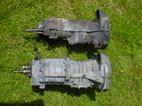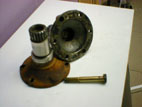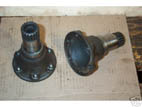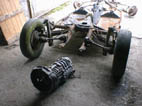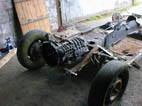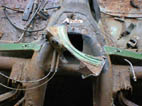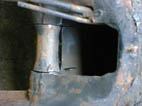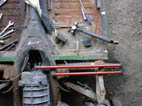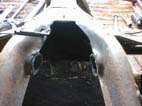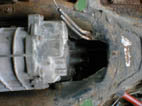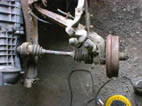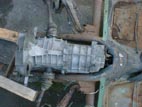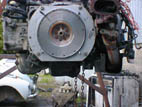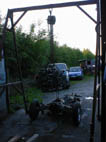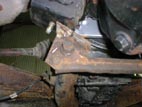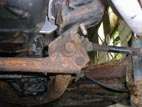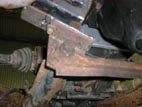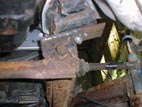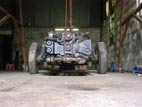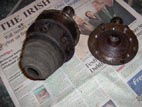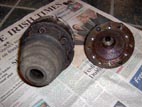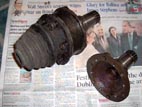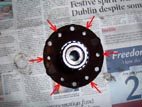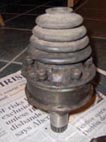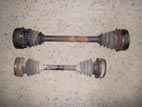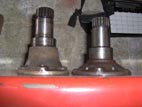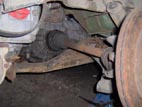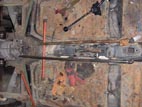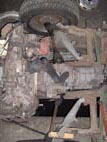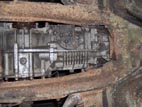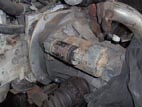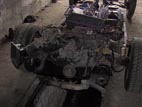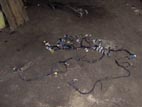Trev's VWRX Project
Engine-Transmission
|
Engine-Transmission
|
| After
ages and ages of pie in the sky "what if..."
type of dreaming I took the plunge and bought myself a stomper of an engine:
a 2.0 Turbo from a '99 Subaru Impreza. As far as I can gather, these are
rated as having about the 210BHP mark when in the Impreza, but that's
while running a power steering pump and air-con, and all the exhaust gasses
having to pass through a catalytic converter. That figure should work
out a few BHP higher by the time I've fitted it in a beetle as power steering
and air-con won't be much use to me and I won't be required to run a catalytic
converter. Plus I'll be pushing it all through just 2 wheels as opposed
to the Impreza's 4WD. That means there will be slightly less frictional
losses without the extra differential and shafts. The engine is known
as an EJ20T to those in the know (wink!). I had to ask to find this out!
(Thanks Rich!) I bought the engine in Co. Cork, and was able to see and hear the car running before the engine was removed. The car was written off at 26,000 miles by its insurance company as it was subject to salt water flooding over its back half (it was parked on a boat ramp and the tide came in!) It wasn't crashed and had the proverbial single lady owner to boot! |
|
Subaru 2.0 Turbo
|
The gold coloured bit on the left is the inlet from
the intercooler, the red bit on the right is the exhaust outlet from
the turbo
|
Transmission:
The engine will be fitted to a stock Porsche 915 transmission via an engine
adapter kit. The transmission will have to be raised and moved forward in
the chassis. The raising will allow extra ground clearance for the extra low
sump and exhaust pipework that the engine is fitted with. The moving forward
is necessary because I want it to fit under a stock engine lid. It will also
move some weight forward in the car, making for less tail-happy handling!
Moving the gearbox forward may necessitate chopping the centre out of the
torsion tube. Since this is the anchor point for the torsion bars, the bars
and inner anchor points will have to be refitted further outboard in the chassis.
The transmission came from a 1974 2.4 litre 911.
|
Porsche 915 transmission
|
Comparison between VW transmission (top) and Porsche
|
Cooling:
Cooling will have to be addressed soon. Whatever happens, the radiator will
be mounted in the front of the car, in the spare wheel well, and air will
be ducted up from a scoop in the floor of the well. Copper pipes will run
the length of the car, probably along the central tunnel and join up with
the engine. The engine has an intercooler, and I will have to figure out the
best place to locate this to get a good flow of air through it.
Engine:
I've sent away the cheque to DS Tuning in Germany to have the adapter kit made, it should arrive within the next week. To have the kit made to suit the Porsche transmission I had to first locate a flywheel to suit the gearbox. Mike Ghia came to the rescue, he had one in stock, and as soon as I received it from him, I sent it off to DS for modification. I'm not entirely sure why the Porsche flywheel was required instead of the Subaru item, but I'm sure that when the kit arrives it will be obvious. Because the Porsche gearbox is being used, I will have to get a clutch kit to suit. This I will get from a motor factors like German, Swedish & French or similar. The Porsche flywheel is a plain disk with no toothed edge. Apparently the starter ring gear bolts onto the clutch cover. I don't know whether this comes as part of the clutch kit or not. If it doesn't, I'll have to go hunting again!
Transmission:
When I bought the gearbox, it came with the gear selector rod, gear lever and the big bracket that bolts to the Porsche central tunnel. Normally if this transmission was to be used in a beetle the Porsche selector rod would need to be lengthened by a few inches. I will be moving the gearbox forward as much as the CV joints will let me in an effort to move the centre of gravity forward and make the car a little less tail heavy. However, the 'box was missing the output shafts that the CV joints bolt onto so I had to locate a replacement pair. After discovering there was an independent Porsche specialist in Ireland I gave him a call to see if he had anything to suit. It turned out he did and he supplied them to me. He's Howard Langridge of Langridge Porscha in Kildare.
I still have to see which CV joints will bolt onto the output shafts, I remember hearing somewhere that VW Type 2 CVs can be used, but I'll have to do some more research to verify this.
Driveshafts will have to be uprated over the stock VW IRS items. Porsche 944 shafts seem like a logical way to go, they're the same length as the VW ones and are made of sterner stuff, so should be more capable of transmitting the power.
|
Output shafts for the 915 transmission.
|
Engine & transmission:
I received the engine adapter from DS Tuning in Germany in the post on Wednesday 6-8-03. It included a large adapter ring with 4 studs sticking out, one of which was longer than the rest, a flywheel to suit the Porsche transmission and some shorter studs for fitting the plate to the engine. The flywheel was the one that I had sourced from Mike Ghia and posted over to them to modify for the Subaru engine. They either welded on a thick boss onto the engine side of the flywheel or made a completely new flywheel to the correct specs. I can't see any signs of welding, so I presume they made a whole new one. Either way, it's got the correct bolt pcd for the end of the Subaru crank and the correct bolt pcd for the Porsche clutch. The gearbox input shaft support bearing was retained in the stock position.
I got the adapter home on Saturday 9-8-03 and proceeded to fit it up to the engine. It needed a small amount of clearancing to it's outer edge to fit it around the turbo bracket, but nothing a short zap with the grinder didn't sort out. The two long lower studs on the Subaru engine had to be removed and replaced with the shorter ones supplied in the kit. The other two studs supplied were fitted to the top of the engine. The adapter plate slipped on easily then, being located by the 4 studs and 2 dowels protruding from the case. The oil drip tray had to be removed from the bottom of the engine to facilitate fitting of the adapter. The flywheel was then bolted onto the end of the crank via the original 8 bolts and then the gearbox was fitted to the 4 studs that protrude from the adapter. One stud is longer as I said, this is because it secures the starter along with another stud on the gearbox. I haven't got a clutch, ring gear or starter yet so obviously they weren't fitted. Incidentally, I trial fitted an old beetle starter motor I had lying around and it fits the gearbox alright, but I'm not sure if it would be compatible with the Porsche ring gear. Also, the Porsche transmission doesn't have a starter support bush so the beetle starter probably won't be suitable.
Here are some photos of the fitment of the adapter and then joining the engine to the gearbox. They're of really bad quality because the only camera I had at the time was a mobile camera phone. I'll get better pics soon... (better pic below! 18-7-04)
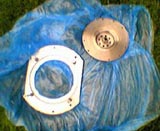 |
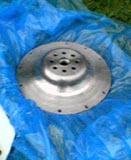 |
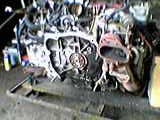 |
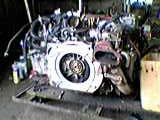 |
|
The adapter ring and flywheel
|
raised boss on flywheel
|
Subaru engine with stock flywheel removed
|
with adapter ring fitted
|
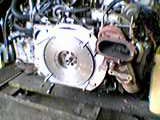 |
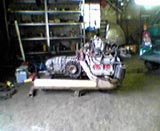 |
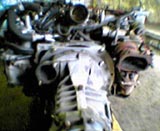 |
|
|
with modified Porsche flywheel fitted
|
engine and gearbox meet for the first time!!
|
plate can be seen between gearbox and engine
|
12-1-04:
Engine & transmission:
I got a single 944 Automatic drive shaft with the rear brake and suspension
parts. It's the wrong length to be of any use to me but at least it will
yield a pair of CV joints to use while setting up the location of the gearbox
in the chassis. It remains to be seen if the bolt pattern of the cv joint
is the same as that of the output flange. Fingers crossed!
Cooling:
The Subaru engine will probably need more air to cool itself than the stock
VW engine, so I will place the radiator up front in the spare wheel well
as originally planned to get the coolest air. I will weld in the slotted
front apron from an air-conditioned 1303 to keep it all looking factory.
The apron is holed from rust so was going to be replaced anyway.
